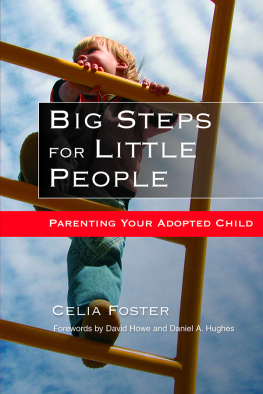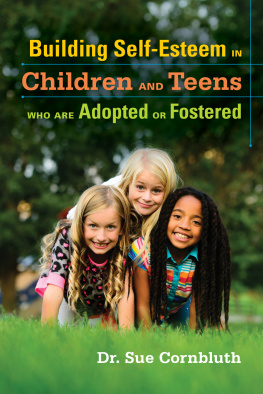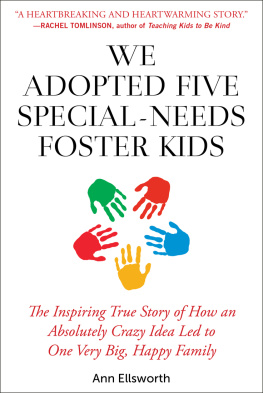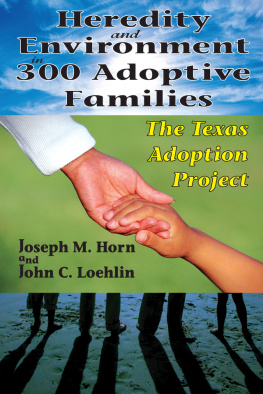The International Library of Sociology
ADOPTED CHILDREN
HOW THEY GROW UP
Founded by KARL MANNHEIM
The International Library of Sociology
THE SOCIOLOGY OF GENDER AND THE FAMILY
In 15 Volumes
| I | Adopted Children | McWhinnie |
| II | Britain's Married Women Workers | Klein |
| III | Families and their Relatives | Firth et al |
| IV | The Family and Democratic Society | Folsom |
| V | The Family and Social Change | Rosser et al |
| VI | The Family Herds | Gulliver |
| VII | Family Socialization and Interaction Process | Parsons et al |
| VIII | Foster Care | George |
| IX | From Generation to Generation | Eisenstadt |
| X | The Golden Wing | Yueh-Hwa |
| XI | In Place of Parents | Trasler |
| XII | In Retirement | Bracey |
| XIII | Middle Class Families | Bell |
| XIV | Nation and Family | Myrdal |
| XV | Women's Two Roles | Myrdal et al |
ADOPTED CHILDREN
HOW THEY GROW UP
A Study of their Adjustment as Adults
by
ALEXINA MARY MCWHINNIE
Foreword by
EILEEN YOUNGHUSBAND
First published in 1967 by
Routledge
Reprinted 1999, 2000, 2001 by
Routledge
2 Park Square, Milton Park, Abingdon, Oxon, OX14 4RN
Transferred to Digital Printing 2007
Routledge is an imprint of the Taylor & Francis Group
1967 Alexina Mary McWhinnie
All rights reserved. No part of this book may be reprinted or reproduced or utilized in any form or by any electronic, mechanical, or other means, now known or hereafter invented, including photocopying and recording, or in any information storage or retrieval system, without permission in writing from the publishers.
The publishers have made every effort to contact authors/copyright holders of the works reprinted in The International Library of Sociology. This has not been possible in every case, however, and we would welcome correspondence from those individuals/companies we have been unable to trace.
British Library Cataloguing in Publication Data
A CIP catalogue record for this book
is available from the British Library
Adopted Children, How They Grow Up
ISBN 0-415-17640-9
The Sociology of Gender and the Family: 15 Volumes
ISBN 0-415-17827-4
The International Library of Sociology: 274 Volumes
ISBN 0-415-17838-X
Publisher's Note
The publisher has gone to great lengths to ensure the quality of this reprint but points out that some imperfections in the original may be apparent
TO
JAMES
FOREWORD
DR McWhinnie has undertaken an important pioneer study into the life history of people adopted in childhood; indeed this is the first study in this country of an unselected sample of adults who were adopted as children. Dr McWhinnie procured her 58 cases through the cooperation of a number of family doctors who referred to her any patient they knew to be adopted and who was willing to take part in the enquiry. This was an ingenious way of avoiding the obvious disadvantages of follow-up studies of those who later find themselves in psychiatric clinics, the courts or the children's department. None of Dr McWhinnie's cases had come to light through a breakdown in adoption. They all belong therefore to the large group of adopted children about whose happiness or unhappiness, success or failure in life, nothing is known in any systematic way.
Inevitably when knowledge is at a minimum prescriptions grow up based upon intuition and hallowed by time. Dr McWhinnie looks at these against the findings from her 58 cases (six of whom were long term foster-children) and finds that there is some truth in some clichs and no proof in others. Thus for example, fewer children did well where the adoptive mother was over 50 when the order was madepartly because this aroused other people's suspicions about the relationship. On the other hand, 13% of such adoptions were a success. Family patterns, for example whether or not there were natural children of the adoptive parents, material conditions and class status had no invariable significance in themselves. As Dr McWhinnie says:...it emerged that much more important than family pattern as such were the basic attitudes in the family to all the children whether adopted or not. In other words: spontaneous and real love for children for their own sakes was the only sure safeguard against all the foreseen and unforeseen hazards of adoption.
On the searching criteria which she applied to each case, Dr McWhinnie found that 15 of the adopted adults had made a successful and happy adjustment to life. 10 others were at the opposite end of the scale. And there were a further 21 who had had or were still struggling with severe emotional problems related to their adoption situation.
The detailed case histories which are an invaluable part of the study show the efforts made to employ objective criteria in the largely uncharted field of child nurture, where there are comparatively few studies that clarify norms in different social groups and at different periods. Dr McWhinnie rightly stresses that these histories are both introspective and retrospective. Nonetheless common elements emerge, for example the first doubts about the biological relationship and the lengths to which some children went to discover the truth. And then, as might be expected, the crucial importance of the good or poor relationship with the adoptive parents when the child discovered his adoptive status. If these parents were in the psychological sense indeed father and mother to the child the discovery of adoption was a passing episode rather than the traumatic or isolating experience which it became for children who were already oppressed by impossible demands and lack of love. To the reader these vivid histories of sad or happy childhoods bring out starkly the dependence of the child upon his small adult world, a world in which some of these boys and girls experienced warmth, love and freedom, while others were caught in the web of adult neurosis, self-centredness, possessiveness and rigidityand marked for life by it. Naturally this invites the further question of whether these experiences were any different from the range to which children in their natural families are subject. Dr McWhinnie is emphatic that the hazards of adoption are different from and greater than those for the child in its own family.
Dr McWhinnie's substantial experience as a social worker in the child care field, coupled with her wide reading and scrupulous regard for evidence, resulted in a level of interviewing skill and capacity for conceptualisation unfortunately rare at present in this country. This exploratory study is as important for its pointers as for its findings. It reinforces the acknowledged need for wide ranging further discussion and scientific enquiry to help dispel the terrifying blindness in which at present society sets its legal seal upon adoptive parenthood and then leaves the child to his fate.










